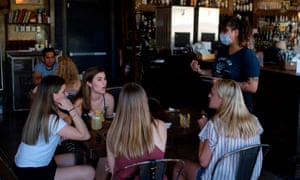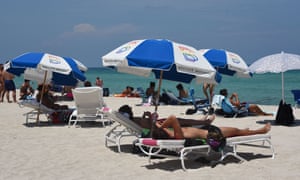As some Americans return to bars, dining and beaches, others shy away, concerned that the virus is still raging

Photograph: Mark Felix/AFP/Getty Images
When Carol Zernial passes by Mexican restaurants and grocery stores in San Antonio, Texas, they seem packed, with “literally no parking places”. But she hasn’t been tempted to dine out, nor has she ventured down a grocery aisle since March.
She does want a haircut, and she’s struck a deal with her hairdresser: they’ll do a trim outside, under a tree, in their masks, baking in the south Texas heat.
“You think, ‘Wow, this is really stupid. This is unnecessary,’” Zernial said. “And I can tell you, I have had actual nightmares, I have had sleepless nights worrying about haircut, no haircut.”
Two Americas have emerged from the coronavirus pandemic: one where protesters cry out, armed, for a return to normalcy, and another which shies away, concerned that the virus is still raging.
Zernial’s trepidation stands in stark contrast with the teeming bars and pool parties that have become symbolic of much of the United States’ devil-may-care attitude toward Covid-19, especially across a swathe of southern states like Texas that have embraced reopening their economies.
But even as those mask-flouting crowds go viral, a second contingent watches, shocked, from a safe distance.
“We admire our individual freedoms, but the individual freedoms do not outweigh the common good,” Zernial said. “Those are the words that I would like to hear from our leaders, is that they’re all looking out for the common good.”
Instead, officials have offloaded that social responsibility onto constituents. Day spas, movie theaters, beer gardens and theme parks are among a cornucopia of hands-on attractions in certain parts of the country that have permission to welcome back customers, despite more than 116,000 deaths in the US attributed to the virus.
“People are seeing this as a personal decision, and it’s based on our own personal risk tolerance,” said Irwin Redlener, director of the National Center for Disaster Preparedness and a professor of public health and pediatrics at Columbia University. “That’s not public health, because in public health, your risk should not be my risk.”
As Beth Harris watches cases tick ever upward in her North Carolina county, she’s concerned for those who don’t have the privilege to work from home. She expressed irritation with her Facebook friends who rattle off lines such as “you only live once” or “I can’t breathe in the mask, so I’m not gonna wear it”.
“People say, ‘freedom, I need my freedom,’ but with freedom comes responsibility,” Harris said.
Although a definitive cause-and-effect can’t be scientifically proven just yet, the timing of states reopening, then experiencing a surge in coronavirus cases suggests the two are intertwined, said Eve Wittenberg, a senior research scientist for the Center for Health Decision Science at the Harvard T H Chan School of Public Health.
After revelers flocked to beaches and bars over Memorial Day weekend, average daily new Covid-19 infections spiked in 21 states and nationally last week, according to the Washington Post. In places as disparate as Texas, Florida, North Carolina and Oregon, hospitalizations have trended upward as well.
Some politicians are hitting the brakes. But under pressure to revive a wheezing economy, others are charging full steam ahead with reopening.
“I think there’s a big component of politics, and the public health response has become politicized, which means anything from wearing a mask to any of these restrictions now have this political layer on it,” said Wittenberg.
Whiplashed by the US government’s mixed messaging, some Americans have looked abroad for guidance. Harris stocked up on vegetarian staples after hearing about food shortages from a friend in northern Italy. In Palo Alto, California, Sarah Liang has been watching Taiwan and Germany, where officials have been more successful in culling infections.

Nadine Herbst started paying attention to the pandemic back in January because of her husband’s work contacts in China. From her home in Austin, she watched as her friend in Valencia, Spain, went into a far more stringent lockdown, where helicopters supposedly monitored rooftops for fraternization.
“I kind of am trying to have a global view of what’s happening, to see how we press forward. And maybe that’s why I’m more cautious than most people are,” Herbst said.
She’s still unwilling to eat inside a restaurant, partially because the dining experience of masked waiters and spread-out tables seems almost apocalyptic to her. But after weeks in isolation, she and her family have started to re-emerge for haircuts or to hang out with friends. It’s not so much that she’s no longer afraid; she just knows she can’t live behind closed doors forever.
“We’re still being careful. You know, we’re still making calculated choices,” Herbst said.
A few states over, in California, Liang described a far more stagnant scene, where she has barely noticed any difference, other than a slight increase in traffic, despite the state’s phased reopening. As soon as masks became a recommended safeguard, the majority of the people in her orbit started wearing them on walks. She still jogs past them with a 6ft berth.
Other communities aren’t so circumspect, despite facing the same existential threat, albeit potentially on a smaller scale.
“The reality is that Covid-19 is now in big cities, suburbs, small cities,” said Marcia Ory, a professor at the Texas A&M School of Public Health.
In Johnson City, Tennessee, Elizabeth Tetrick is taking extra care so she can safely help her father, who was recently diagnosed with cancer. Compared to the rest of America, she doubts her family’s reaction to the public health crisis has been especially conservative.
They’ve celebrated special occasions outside at restaurants, and her eight-year-old daughter goes on playdates hiking or to the zoo. But she’s stopped shopping at certain local grocery stores, where people eyed her strangely for even donning a mask.
“I don’t think there’s a lot of fear in the community anymore, and there’s not a strong, unified voice of leadership on the topic,” she said.
When Zernial drives north to the panhandle from San Antonio to visit her elderly father, she sees fewer and fewer people using masks or keeping their distance.
“I certainly never expected to live through a pandemic. And then to have a pandemic and have a lack of political will … to make tough decisions, or to at least enforce the basics, the wearing of a mask,” she said. “We should all be able to get comfortable with that.”



